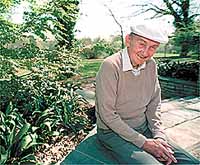Fred Fletcher, 89, dies of prostate cancer
Story from the News and Observer Web Site: January 10, 2000
He gave Raleigh lively
radio and recreation
By TIM SIMMONS,
News and Observer Staff Writer
|

News and Observer Staff Photo
By Corey Lowenstein Fletcher, at 85. |
Fred Fletcher had his family name, he had his position as president and general manager of Capitol Broadcasting and he had his passion for improving Raleigh’s parks system. But the thing most people remember about Fletcher, who died Saturday at age 89, was his ability to connect with people.
“A person’s age really didn’t matter to Fred. They could be a child or they could be very old. He could reach every one of them,” said Charlie Gaddy, a longtime news anchor for Capitol Broadcasting who retired in 1994. “Fred was an entertainer, no matter the size of the crowd.”
Fletcher died of prostate cancer, according to his son Bill.
Fletcher’s career at Capitol Broadcasting and his half-century of work with Raleigh’s parks and recreation system helped define a part of what the Triangle is today. Born in 1910 in Apex, he was part of a family that permanently changed radio and television in North Carolina.
Having just graduated from the University of North Carolina at Chapel Hill, Fred became the manager of WRAL radio in 1939 — a station that was all of 250 watts strong. He moved into the job because his brother Frank had urged their father, A.J., to buy a station and obtain a license.
The dominant station of the day was Durham Life Broadcasting Co.’s WPTF with 50,000 watts and an NBC television affiliation. That meant that WPTF not only carried the popular programs of the day, it also meant that listeners could tune in each morning to hear the network news accounts of World War II.
With his fledgling station taking a beating, Fletcher decided to offer people something he thought they could use — a bit of entertainment. Every morning he would read fairy tales — Rumpelstiltskin, Goldilocks and Henny Penny, changing his voice for each character. His rabbits didn’t just hop, they went “elipity, elipity, elipity.” His foxes didn’t dash about, they went “boogity, boogity, boogity.” When he needed someone to knock on a door, he’d rap his bald forehead with his hand. Within six months he had a 60 percent share of the audience against the NBC news. He was known throughout town as the Fairy Tale Man.
The success created an audience for a variety show, interviews with celebrities and a place for the public to do everything from swapping goods at “The Trading Post” to announcing the birth of their new baby. “It’s not an overstatement to say he shaped radio in Raleigh,” said Frank Daniels Jr., former publisher of The News & Observer. “He understood the importance of a radio station being connected with its audience.”
Despite his love for radio, the future in broadcasting was television. After a fight with WPTF, Fletcher’s father was awarded the franchise for Channel 5, which became WRAL-TV. The parent company for the stations was Capitol Broadcasting and Fletcher starting moving up the ladder of his father’s organization. He also became active in politics, serving on the Raleigh City Council from 1947 to 1949 and as chairman of the Raleigh Parks and Recreation Commission from 1956 to 1985.
His resume includes a long list of boards and associations, professional and civic. By 1966 he was named president and general manager at Capitol Broadcasting, a title he held until 1975, when he retired. It was during the early years of his career that WRAL-TV and dozens of radio stations known as the Tobacco Road Radio Network aired the editorials of a columnist named Jesse Helms. With Helms and other conservative editorialists preaching the virtues of free enterprise and the dangers of creeping socialism, Fletcher later said he believed his family had a significant impact on state and national politics.
But Fletcher was also one of the first radio-TV executives to hire an African-American broadcaster. “It was many years ago, long before it was common,” said Clarence Lightner, Raleigh’s only black mayor, who served from 1973 to 1975. “It was something you couldn’t help but notice.” It was a different time then in many ways, Helms said. “Raleigh was still old Raleigh and small Raleigh. One person, one family, could make a big difference.”
It was also the kind of time when someone like Fred could black out his two front teeth, put on a red nightgown and sing in a lisp, “All I want for Christmas is My Two Front Teeth” as part of a holiday television show — and people loved it. It would be decades before the Triangle would become a major media market with Capitol Broadcasting as its dominant player.
Those who know the family say A.J. Fletcher could see that time coming, always keeping an eye on the horizon. “His dad was the businessman. Fred loved people,” Helms said. “He was a character — a delightful character who wore a happy face in every one of his endeavors.”
After retiring from Capitol Broadcasting, Fletcher devoted an even larger share of time to improving the city’s park system. First appointed to Raleigh’s Parks and Recreation Advisory Board in 1946, he constantly lobbied for open space and recreation centers. Almost 50 years after he joined the parks board, he was recognized by the National Recreation and Park Association as one of the country’s outstanding citizen-board members. He is the Fletcher in downtown Raleigh’s Fletcher Park. “He really worked for the whole community,” said Raleigh Park Director Jack Duncan. “He understood the benefits of parks and recreation for all people.”
News and Observer staff writer Tim Simmons can be reached at 829-4535 or tsimmons@nando.com